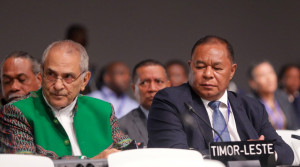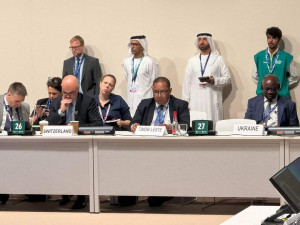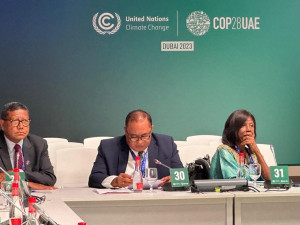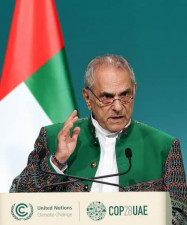Timor-Leste participates in the 2023 United Nations Climate Change Conference - COP28

The Minister of Foreign Affairs and Cooperation, Bendito dos Santos Freitas, accompanied the President of the Republic, José Ramos-Horta, to the 2023 United Nations Climate Change Conference (COP28), on December 2nd and 3rd, 2023, in Dubai, United Arab Emirates. 
In his intervention at the High-Level Segment of the Global Assessment at COP 28, Minister Bendito Freitas highlighted the importance of the means of implementation for the success of the Paris Agreement and the need for a global assessment. He addressed the shortcomings in “mitigation, adaptation and loss and damage due to the lack of means of implementation” and urged “developed countries to mobilise the 100 billion dollars and not to fail in their pledges from 2023 to 2024, doubling their support to 200 billion dollars by 2030”.
He also called on the leaders of developed nations to “support developing nations with the development and implementation of green technologies to adapt to climate change”, which will “lead us on a collective march with hope and optimism to collaborate and make our planet a better place and a lasting home for all, and for future generations”. 
The Minister of Foreign Affairs and Cooperation also participated in a parallel meeting, co-organized by the intergovernmental organisation g7+ and the United Arab Emirates, on “Strengthening Resilience by Stepping Up Climate Action in Fragile and Conflict-Affected Environments”. During the discussions, the g7+ member countries agreed to collaborate with the United Arab Emirates to accelerate the implementation of climate actions through financial contributions from industrialised or developed countries to combat climate change and avoid negatively impacting less developed countries. 
In his speech, the President of the Republic welcomed the historic decision to operationalise the loss and damage fund, emphasising the need for additional funding to deal with the impacts of climate change. The Head of State urged the World Health Organization (WHO) to declare a Public Health Emergency of International Interest.
José Ramos-Horta highlighted the multiple impacts of climate change in Timor-Leste, such as floods, droughts, landslides and rising sea levels, which affect agriculture, food security and infrastructure.
He also warned of the threats such as illegal fishing and plastic pollution that Timor-Leste faces and made a national commitment to a low-carbon development path, prioritising renewable energy and reforestation.










































